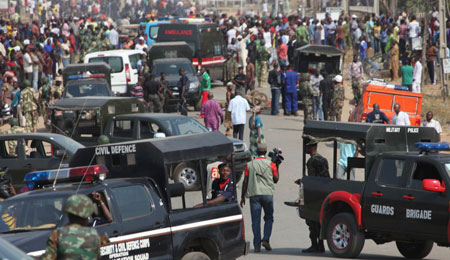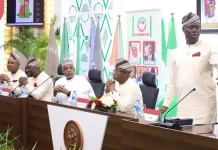Lagos – a free city too busy making money to hate anyone – sees the insurgency by Boko Haram as a Northern affair. Lagosians have relatives and friends up North, and are bothered by the mayhem, but not as much as those in the eye of the storm.
Security warnings to arrest the attention of Lagosians, amid the daily hustle for bread, butter and fortune, cause them to keep their ears to the ground for news of the presence of suicide bombers in the city that never sleeps.
But the explosions and the carnage were tales of the unexpected. Victor Ebimomi, Ishaya Ibrahim and Goddie Offose report.
Scene of the tanker explosions.
Twin explosions at a fuel depot in Lagos on June 25 had sent jitters down the spine of vibrant Lagos, days before soldiers visited violence on the city on July 4, beating up civilians and setting ablaze bus rapid transit (BRT) buses, which crippled the efficient mass transport system for hours.
Lagos, the melting pot of Nigerians and foreigners alike, was raising its guard anticipating attack from Boko Haram insurgents.
Atrocities by Boko Haram bombers are confined largely to the North, but the South, where Lagos is located, was put on red alert two weeks ago when suspected members of the sect were arrested in Abia State.
However, the explosions Lagos got were of a different kind; but deadly all the same.
Fuel tank farms
The fuel inferno at Folawiyo Energy tank farm and Alex Junction, both on Creek Road, Apapa, Lagos, on June 25 claimed four lives and forced Governor Babatunde Fashola to convene a security meeting with the operators on July 1 to forestall a recurrence.
Fashola directed that any vehicle that cannot be accounted for should not be allowed into tank farms and should be reported to the security agencies, among other measures.
But when TheNiche visited the tank farms at Ibru Yard on Thursday, July 3 and Friday July 4, there were pointers that the message had not sunk in.
The front of the stretch of the yard, which comprises 15 tank farms, swarmed with all manners of people, some of them touts.
Apart from oil tankers, there were smaller vehicles parked in the area.
Tank farms in the yard include Integrated, Sahara, Ibachem, Capital, Ascon, SPOG, Energy Network and Aquitane.
Unions in the tank farms, all of which are affiliated to the National Union of Petroleum and Natural Gas Workers (NUPENG), showed more interest in collecting charges than security.
Enquiries from union members about the Association of Tank Farm Owners drew a blank.
A market, known as ‘Westminster’, which is tucked between tank farms, makes the co-ordination of vehicle and human traffic difficult.
If vehicles are checked at all, it is after they have gone some distance away from the gates of tank farms. The checks are limited to the verification of tickets and financial clearance, nothing about security.
A logistics officer in one of the companies belonging to the Independent Marketers Association of Nigeria (IPMAN), who preferred anonymity, said so far “there is no improvement in any security arrangement.”
According to him, checks in the tank farms are for safety and verification of tankers lifting fuel.
He explained that “the only check is to know the product loaded last, in order to avoid adulteration. If a tanker loaded petrol last, they will not allow it to load kerosene.” A tanker has to be cleaned properly to load another type of product.
Nevertheless, sometimes private security guards open and close the gate for a fee.
Security agents line their pockets
There are security agents in the axis, but they are more interested in lining their pockets. These include personnel from the navy, Nigeria Security and Civil Defence Corps (NSCDC) and Lagos State Traffic Management Authority (LASTMA).
They demand bribe from tanker drivers before they are allowed near the loading point.
LASTMA officials pretend to ensure traffic order on roads leading to the tank farms; naval and NSCDC personnel pretend to bring order to the activities of rowdy tanker drivers.
As tanker drivers scheme to gain advantage over one another, they are ready to part with any amount of money demanded by the security agents to allow them to queue up to load.
Naval officers allegedly collect a flat rate of N500 per tanker, but if the road is jam-packed, they could raise the price to N2,000. NSDC and LASTMA officials allegedly negotiate their own fees.
Clearing out terrorist suspects
After the explosion, the police began moves to clear the state of suspects.
Scores have been arrested in parts of the state where suspected criminals are said to reside. They include Apapa, Ijora, Berger, Isolo, Mushin, and Idi-Araba.
A new twist
What seemed like a congenial working relationship between the Lagos State government and the army was shattered on Friday, July 4 when a bus rapid transit (BRT) driver knocked down and killed a soldier on his motorcycle.
The soldier was based in the Army Education Corps in Sabo, Yaba, Lagos.
The death sparked soldiers to settle a score with Fashola, whom they see as not having regard for them, especially how Fashola reprimanded Colonel K. I. Yusuf on July 17, 2012 when he caught him driving on the dedicated BRT lane.
Yusuf drove an green army Peugeot 406 (marked BO1 – 150 NA) when Fashola spotted him on the BRT lane. Yusuf alighted from the car and saluted Fashola repeatedly, saying, “I am sorry, very, very sorry.”
Soldiers who spoke with TheNiche after the incident said Fashola disrespected Yusuf the way he treated him.
So, when a soldier in the army Education Corps was killed by a BRT driver in Palmgrove on Ikorodu Road on July 4, about 50 soldiers allegedly descended on BRT buses. The drivers fled.
Millions of naira up in flames
At least five BRT buses were set ablaze and many others vandalised. Scores of commuters received injuries.
A BRT bus is estimated to cost N70 million.
Lagosians rely on the transit system for its cheap fares and reliability to beat traffic jam.
“The soldier was not on the BRT lane, he was on the main highway. But the BRT driver left his lane and was on the main road with other vehicles, that was how he killed the soldier,” a witness narrated.
The soldiers reportedly stormed Awoyokun junction in Palmgrove at about 7am. They beat everyone in sight before descending on drivers of BRT buses. Passengers fled the buses as the soldiers went on a beating spree. They sent a lady rolling on the tarmac with a baby strapped to her back.
There was plenty of mayhem on the stretch of Ikorodu Road – one of the busiest in the city – with hoodlums cashing in on the confusion to raid homes and offices.
The windshields of BRT buses were shattered by male and female soldiers. In a domino effect, buses parked in a row went up in flames, one after another.
Journalists beaten up for taking photographs
At least 80 soldiers caused the rampage between Onipanu and Palmgrove. They asked pedestrians to raise their hands to avoid being beaten.
Journalists who attempted to take photographs were severely beaten by soldiers who belonged to the security outfit, “OP MESA”, and had to be taken to hospital.
Among the journalists allegedly manhandled included Kenneth Ogbechi (Nigeria News Desk), and a Channels Television reporter, who do not want her name in print.
Pedestrians who made calls on their handsets or seen just holding a telephone were slapped and kicked by the soldiers, who seized or damaged the telephones.
The accidental killing on July 4 was not the first.
In October last year, a BRT driver knocked down two solders, a male and a female, on the service lane on Ikorodu Road. Both died at the Military Hospital, Yaba, Lagos.
Fasholas’s reaction
In his reaction to the latest carnage, Fashola, expressed disappointment, saying: “To put it mildly, that public servants – and that is what soldiers are – paid with taxpayers money will act in a manner that is being suggested here.
“And I say being suggested because I am waiting for the official report to let me know who really played what role, what happened, whether or not even the Brigade Commander has been able to identify the people who were involved.”
He lamented the carnage, wondering, “how damaging public property is restitution for any injury that may have come.
“There is an allegation that somebody who was not supposed to be on the BRT route was there, and as far as I know, if something happens to you while you are conducting an unlawful act, it is a criminal offence in its own sense.”
Nobel laureate, Wole Soyinka, also condemned the assault on civilians, saying it is wrong for soldiers to attack people because one of their own was killed in an accident.
Telephone calls to Lagos State Information Commissioner, Lateef Ibirogba, and Fashola’s Media Adviser, Hakeem Bello, were not answered.
Defence Headquarters Information Director, Brigadier General Chris Olukolade, could not be reached on the telephone for comment, though he reportedly said the perpetrators were not soldiers but hoodlums.
Police Public Relations Officer (PPRO) Lagos State Police command, Ngozi Braide, confirmed that the incident is being investigated.
Army denies soldiers’ involvement in carnage
However, Deputy Director of Army Public Relations, Lt. Colonel Omale Ochagwuba, said it is “totally untrue” that soldiers attacked and vandalised BRT buses.
After an “innocent law abiding soldier was killed on the normal lane being plied by everybody” the mayhem visited on the BRT buses was the handiwork of hoodlums who took the opportunity to vent their anger on the buses for reasons best known to them, Ochagwuba said in a statement.
“In a situation like this, people are bound to wrongfully accuse soldiers because they were seen around the offending bus which was not even attacked …. The BRT buses vandalised were far removed from the scene of the accident,” he added.
“It was the same soldiers who are being wrongfully accused of burning buses and causing mayhem, which is not true, who were the ones that secured the BRT bus and protected it from hoodlums before it was later towed into the barracks for safety and also prevented the hoodlums from causing further mayhem on the road and cleared the route for traffic to flow.
“We have pictures of the bus at the scene of the accident and while it was being towed away to safety. The bus in question has since been released to the BRT management.”
Ochagwuba reiterated that the army is a professional force which is law abiding like any other citizen, and the military is a highly disciplined organisation which also takes steps to see that its errant members face justice for wrongdoing.















